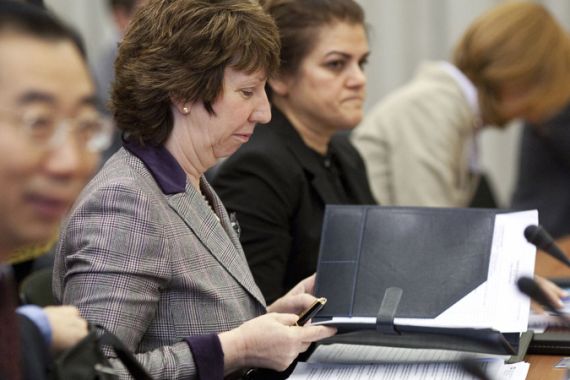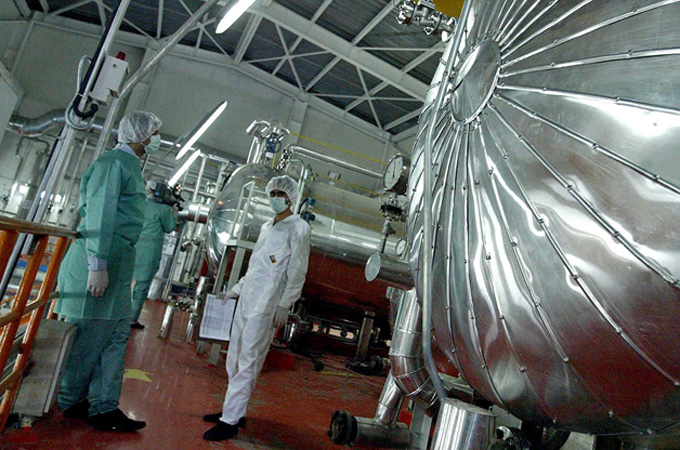Turkey hosts Iran nuclear talks
Little hope of breakthrough as six world powers and Iran meet in Istanbul to discuss Tehran’s nuclear programme.

 |
| Iran denies its uranium enrichment programme is aimed at developing nuclear weapons [EPA] |
Iran and six world powers have begun talks in Turkey on Tehran’s controversial nuclear programme, but diplomats say hopes of a breakthrough are slim.
“No one is expecting any big breakthrough, but Iran needs to show that it is interested in engaging in a wider process,” said one diplomat as the opening session began on Friday.
“There are fundamental issues Iran needs to address and those are pretty clear, but no one’s expecting any great shift.”
The five permanent members of the UN Security Council – Britain, China, France, Russia and the US – plus Germany (collectively known as the P5+1 group) have said they believe Iran’s uranium enrichment process is a cover for developing nuclear weapons.
Iran has repeatedly denied the allegations, saying it is developing the technology to meet its civilian energy needs.
Catherine Ashton, the EU policy chief, is representing the P5+1 in Istanbul while Saeed Jalili, Iran’s top nuclear negotiator, is heading his country’s delegation.
The delegations are meeting behind closed doors for the two-day meeting at Ciragan, an Ottoman palace on the banks of the Bopshorus.
Wide differences
Following the first round of talks in Geneva last month, the two sides emerged with wide differences.
“We want to discuss the fundamental problems of global politics at Istanbul talks,” Jalili said on Friday.
| In Depth | |||||||||||||||||
|
The talks will need to get to a point where the two sides agree, Al Jazeera’s Mohamed Vall reported from Istanbul. “But each side will not talk about the specific points the other side wants to raise,” he said.
Iran wants to discuss global disarmament, Israel’s nuclear capabilities and general non-proliferation while the P5+1 wants to talk about Iran.
“The bigger issues are certainly not solvable here [in Istanbul] because the Iranian challenge is a meaningful one,” Ilter Turan, a political analyst, told Al Jazeera.
“The current system gives an advantage to those who possess nuclear materials and makes the others simply customers of those,” Turan added.
Sanctions issue
The standoff over Iran’s nuclear programme has escalated in the past year, with the United Nations imposing new sanctions and the US and its allies rejecting a revised proposal for Iran to exchange low-enrichment uranium for nuclear fuel from abroad.
Sergei Lavrov, Russia’s representative at the talks, said that the lifting of the “counterproductive” sanctions should be on the table on Friday.
However, Mark Toner, a US state department spokesman, dismissed Lavrov’s remarks. The US has raised the possibility of harsher unilateral sanctions if Iran fails to comply with the demands of the six powers.
Going into the Istanbul talks, Iranian officials said they were ready to discuss reviving the idea of the swap agreement based on one brokered last year with Brazil and Turkey.
Toner said the US was willing to discuss an updated fuel swap proposal, if it reflected the progress Tehran has made on uranium enrichment in the two years since the idea was floated.
Defiant Ahmadinejad
On the eve of the talks, Mahmoud Ahmadinejad, the Iranian president, was defiant, telling a cheering crowd that Tehran would not back down on the issue of its nuclear programme.
“You could not stop us from being nuclear … The Iranian nation will not retreat an inch. The nuclear issue is over from the Iranian point of view.”
Ali Asghar Soltanieh, Iran’s envoy to the International Atomic Energy Agency (IAEA), also delivered an aggresive message, saying Iran’s enrichment activities would continue at an underground facility at Fordow, near the city of Qom, even if its nuclear sites were attacked.
